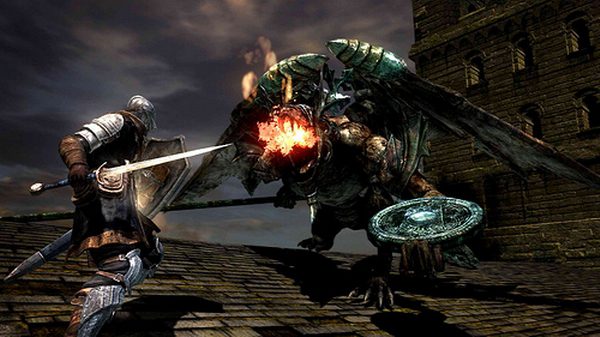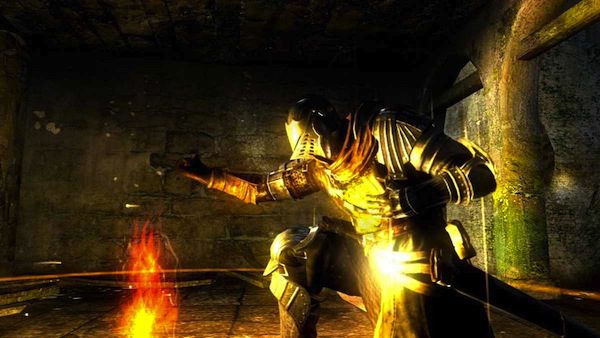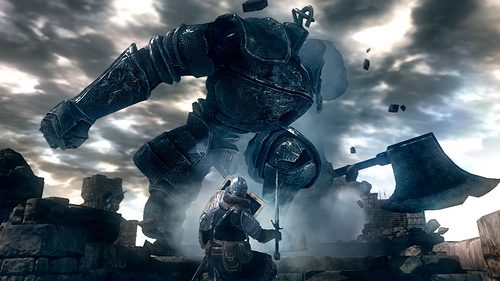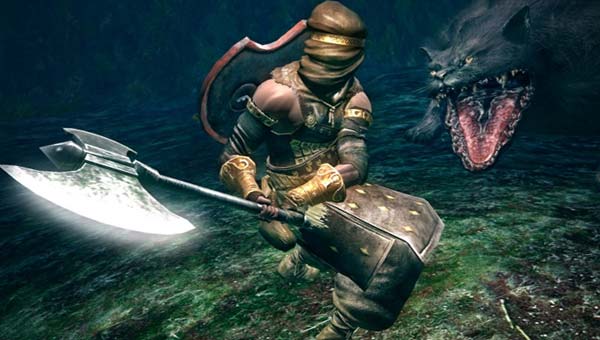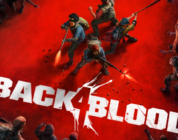Typically, the difficulty level of a game isn’t used as its main selling point, yet the allure and excitement built around Dark Souls is built strictly on the vaunted difficulty. Billed as the spiritual successor to the extremely difficult PS3 exclusive Demon Souls, From Software decided to make the difficulty an even bigger element in Dark Souls. Even the back of the box contains the warning “Prepare to die a lot,” and this isn’t hyperbole. There are hundreds of different ways to die, and it will quickly feel like you’ve managed to find every one of them within a few hours. Dark Souls is every bit the cruel mistress it claims to be.
I am one of those people that will sing the praises of Demon Souls to anyone that will listen. I swept through it a full three times, playing through with various classes, without too much frustration or desperation. This time around, From Software decided to created a game that allows them to flay the flesh from your bones and make you question everything you thought you knew about your gaming prowess. Yet, as brutal as it is, the moments you manage to pick yourself up and finally win out make everything worthwhile.
The similarities between Demon Souls and Dark Souls are comforting at first. The third-person view is still the same, as are your attacks, blocks and your item management. Charging through the opening halls of the gothic insane asylum almost feels like a blow by blow retread of Demon Souls. Dark Souls uses the opening asylum area as a way to hook you, teaching you each control in turn and introducing you to the various treacheries you’ll have inflicted on you. This time around, it isn’t optional, and you are forced to battle your way through it, which is a kindness in long run. And after you defeat your first demon, you immediately understand the type of euphoria and accomplishment that is in store for you. Scrounging through the early corridors hints at the vast wealth that can be uncovered through exploration, but never lets you forget how quickly you can be punished for stopping to smell the roses.
Casting aside the hub world that turned Demon Souls into a fairly straight-forward adventure, Dark Souls allows you to wander, connecting the various cities, boiling swamps and haunted ruins with an idyllic burg, letting you flow between them seamlessly. Instead of giving you a safe place to rest and gather your wits, you are forced to find bonfires amidst the chaos in order to spend catch your breath. These fires act as respawn points, allowing you to spend souls for leveling, refill your health vial, repair your equipment, and they have the added bonus of reviving all of the enemies you dispatched on your way. Learning to use bonfires wisely becomes just another piece of the puzzle. Do you want to grind through enemies you know you can handle over and over, or do you want the respite from your enemies in order to progress or hunt for hidden items? I spent far too long standing in front of a bonfire debating of if I should rest or continue to press on, and I chose poorly many times. You may also see other player’s huddling around the fire in spirit form, letting you know that you aren’t alone in the dark, and that others are struggling through the same trials as you. Seeing them can offer more comfort than you think, and this mental boost can make a world of difference, or they can turn into depressing campfires of regret as you mull over your various mutilations.
Thankfully, there is occasional respite from the frequent maulings. A new online component allows you to call for assistance during times of need. Using one-shot items, and your precious Humanity, you can summon or jump into other games. Before certain bosses you will come across summon signs, a less than subtle hint that going in alone is absolute folly. While talking is still forbidden, running through games with other adventurers acts as a guide. Instead of calling your friends to compare notes, you get to play through the game with them, acting as guide or following along, picking up souls and experience to bring back to your solo campaign.
From Software understands the adrenaline rush that can come with systematically breaking down a difficult obstacle and overcoming it, and that is really what Dark Souls is all about. There is a story here, it just doesn’t matter. The world and its denizens are the story. Dark Souls realizes that it is simply a video game and celebrates that fact at every turn. Navigating the bloodlust of warped monsters, avoiding treacherous pits and unfairly hidden traps, and simply surviving to the next bonfire is the real story. The game play is so deliberate, so focused, that the experience is richer than any possible plot. Every movement and event is a part of the tapestry. Much has been made of the education-through-death mechanic, but there is just as much education in life. Every cliff, bend and turn acts as a road sign to what’s ahead. The type of enemies you’ll face is advertised through the shapes and spaces around you. Defeating opponents also teaches you how to watch, how to think and how to act just as much as their many victories over you.
Crafting your character is by far the deepest part of Dark Souls. Regardless of your class, you can level up the areas you choose, creating a Sorcerer in plate mail or an impervious and nimble Knight. Even the weakest starting character can gain the ability to swing the largest weapons, meaning you are never stuck within one character scheme. With no limit on the amount of equipment you can haul around, creating different equipment sets for different situations is a breeze. An armor covered tank can become a fleet footed thief in hurry, allowing you to truly learn and adapt based on any given situation. No other aspect of the game highlights just how important adaptation and creativity can be to your survival.
For those inevitable times when survival doesn’t quite work out you spend your time as a dead man walking, which works differently in Dark Souls than Demon Souls. Instead of dying and resurrecting as a shimmering ghost with reduced health, you simply lose the ability to use certain functions of the game, such as the online functionality. Invading or assisting another player can only be done as human, and another player can only invade or assist you if you happen to still be human. Souls are still lost at your death, and if you happen to make it back to your bloodstain without dying again, you can recoup your losses. But death doesn’t make you feel significantly weaker this time around, just significantly uglier. Finding a way to resurrect is no longer your guiding force, and you can instead concentrate on the lessons you gleaned from said death. If life is that important however, you can sacrifice Humanity, a new resource that is far too rare, and raise yourself at the next fire.
Humanity is the newest needle in a haystack for players to hunt for. While its power to bring you back to life is certainly handy, since you can only call for assistance while Human, it also grants you more health flasks by Kindling bonfires. Its scarcity, coming only from defeating Demons or from rare items, is yet another wrench thrown into battle plans. Using it too soon can prevent you from summoning much needed help, but waiting too long or spending it unwisely can force you to be just as cut off from your fellow warriors and going at it alone as a trembling zombie.
Demons, those slimy, bulbous creatures that stand as the motivation for your movement from area to area, are oddly enough a huge let down. Sadly, big-guy-with-knife-or-club is the order of the day, and hardly ever changes. Holding to that cliché takes much of the awe factor out of the major encounters. They are still brutal, but the trembling fear you had when you saw the Dragon God for the first time in Demon Souls never makes an appearance here. Anticipation and curiosity were major drives last time around, but in Dark Souls they quickly fade with each vanquished demon. You know what to expect here, even if the attacks and strategies change. Wonder is an important element to Dark Souls, and it’s a tragedy that there isn’t more of that during its supposedly big moments.
With so many layers of attempted high-concept game design, it’s easy to sit in awe of Dark Souls as a concept, but unless you are willing to turn yourself over to it, abuse and all, the cracks in execution will lead to a short lived session with the game. Camera angles often set in the wrong spots. There are seemingly safe walking areas near ledges that turn out not to exist. Cheap deaths fall like rain throughout the campaign, and where death through battle can serve as the day’s lesson, death from poor game design only ruins your hard won progress. Using death as an instruction method is fine in theory, but when so many deaths are cheap and due to bad controls and game play, then there isn’t anything to learn. There are moments when even the most ardent defender will have to convince themselves that, yes, this game really is great. Sadly, most people don’t have the time to waste talking themselves into enjoying the time they spend with a game.
Most of the hype surrounding Dark Souls is over the difficulty level, and that’s certainly earned, but as a whole tapestry, it is difficult to understand how the game will measure up to a wider audience. Demon Souls sold very well, for a PS3 exclusive, but the push for Dark Souls assures that it will reach far more people, and will leave a great many people furious. This is not a game for most people. If you play games to relax, or as a quick distraction for a few hours a week, then this is not the game for you. For those that want to sink dozens of hours into complex systems and overcome challenge after challenge, then this will be your favorite game this year, assuming you can overlook the control problems. From Software has created an amazing game in regards to creativity and difficulty, and I look back on my time with Dark Souls with an enormous sense of pride and accomplishment, and that is the real key. The individual moments are not what make Dark Souls a great game, it’s the journey as a whole. All the hours spent quitting in frustration and mourning lost souls fall away when the credits role and you can think back to all that happened and all that you discovered. Few games can create that feeling of relief and accomplishment like Dark Souls, and, in the end, that is all that really matters.
Review
| Pros | Cons |
|---|---|
| Incredible narration through game play. Fantastical and awe-inspiring settings. | Too many glitches lead to lost progress. Repetitive bosses |
| Rating |

